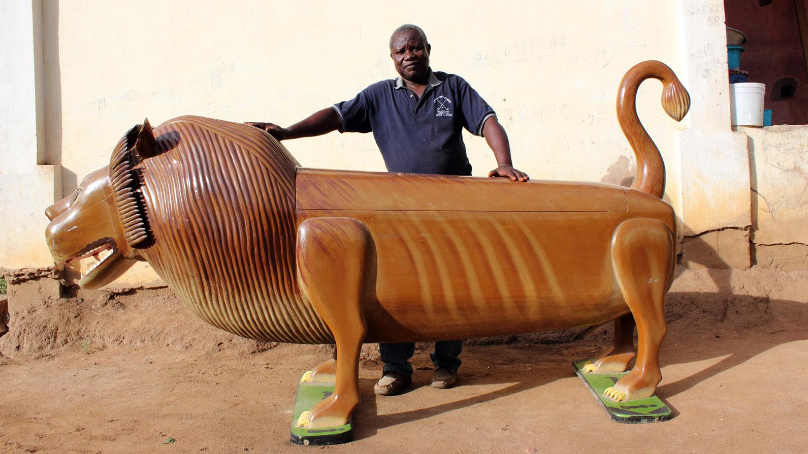Ghana and the Use of Specially Made Funeral Coffins or Caskets

Introduction to Ghanaian Fantasy Coffins
In Ghana, funerals are not just ceremonies of mourning but grand celebrations of life. One of the most unique and culturally rich aspects of these celebrations is the use of specially made coffins, also known as fantasy coffins. These coffins are not only a means of burial but also a profound expression of the deceased's life, personality, and social status. This article explores the fascinating world of Ghanaian fantasy coffins, their cultural significance, and the artistry involved in their creation.
The Origin and Evolution of Fantasy Coffins
Historical Background
The tradition of creating fantasy coffins in Ghana can be traced back to the 1950s. This practice originated among the Ga people in the Greater Accra Region. Initially, these coffins were created for chiefs and other prominent community members, reflecting their status and achievements. The designs often mirrored the deceased's profession, social role, or aspirations.
Contemporary Development
Over the decades, the use of fantasy coffins has evolved and expanded. Today, these coffins are not only used by the Ga people but have also gained popularity across different regions and ethnic groups in Ghana. The craftsmanship has become more sophisticated, with artisans incorporating intricate designs and vibrant colors. Coffins shaped like animals, cars, airplanes, and everyday objects are now common, each telling a unique story about the person being honored.

Cultural Significance of Fantasy Coffins
Honoring the Deceased
Fantasy coffins serve as a powerful way to honor and remember the deceased. They symbolize the individual's life journey, achievements, and values. For instance, a fisherman might be buried in a coffin shaped like a fish, while a teacher might have a coffin designed as a book. This symbolic representation helps keep the memory of the deceased alive within the community.
Community and Social Status
The use of elaborate and artistically crafted coffins is also a reflection of the deceased's social status and the family's respect and love. These coffins often become the centerpiece of grand funeral ceremonies, which are attended by large numbers of family members, friends, and community members. The more intricate and unique the coffin, the higher the social standing of the deceased is perceived to be.
Blending Traditions and Modernity
Fantasy coffins represent a blend of traditional beliefs and modern artistic expression. While the designs may be contemporary, the underlying purpose remains deeply rooted in Ghanaian cultural traditions. These coffins exemplify the integration of traditional values with modern aesthetics, creating a unique cultural artifact that is both meaningful and visually stunning.
The Artistry Behind Fantasy Coffins
Craftsmanship and Materials
Creating a fantasy coffin requires exceptional craftsmanship and attention to detail. Skilled artisans use a variety of materials, including wood, metal, and paint, to bring their designs to life. The process involves several stages, from conceptualizing and sketching the design to carving, assembling, and painting the coffin. Each step is meticulously executed to ensure the final product is both durable and beautiful.
Symbolism and Design
The design of each coffin is carefully chosen to reflect the personality and life of the deceased. Common themes include animals, vehicles, tools, and symbolic objects. The colors used in the design are also significant, often representing cultural meanings such as purity, strength, and peace. For example, white is commonly used to symbolize purity and a peaceful transition to the afterlife.
Innovations and Trends
In recent years, there has been a growing trend towards more personalized and innovative coffin designs. Artisans are constantly exploring new ideas and techniques to create unique pieces that stand out. This innovation is driven not only by local demand but also by international interest, as Ghanaian fantasy coffins have gained recognition and admiration worldwide.
Impact of Fantasy Coffins on Modern Ghanaian Society
Economic Contributions
The production and sale of fantasy coffins have become an important aspect of the local economy. Workshops that specialize in these coffins provide employment opportunities for skilled artisans and contribute to the economic vitality of the community. Additionally, the international interest in these coffins has opened up new markets and opportunities for export.
Tourism and Cultural Exchange
Fantasy coffins have also become a significant attraction for tourists visiting Ghana. Many visitors are fascinated by the creativity and cultural significance of these coffins, leading to increased tourism and cultural exchange. Exhibitions and displays of Ghanaian fantasy coffins in museums around the world further promote understanding and appreciation of this unique cultural practice.
Preserving Cultural Heritage
The continued use and evolution of fantasy coffins play a crucial role in preserving Ghanaian cultural heritage. These coffins are a tangible representation of the country's rich traditions and artistic expression. By maintaining this practice, Ghanaians ensure that their cultural heritage is passed down to future generations.
In Summary
Ghanaian fantasy coffins are a remarkable example of how art and culture intersect to create something truly unique and meaningful. These coffins are not just burial vessels but powerful symbols of life, identity, and community. As we continue to explore and appreciate the rich cultural heritage of Ghana, it is clear that fantasy coffins will remain an integral part of these traditions, celebrating the lives of the deceased and honoring their memory in the most creative and profound ways.
